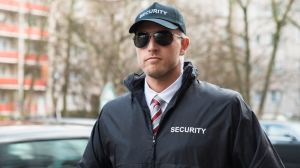Have you ever wondered what it takes to become a bodyguard? In this blog, we will dive into the world of personal security and explore everything you need to know about becoming a bodyguard. From understanding the role and responsibilities of a bodyguard to learning about the different types of bodyguards and where to find employment opportunities, we’ve got you covered. We will also discuss the key traits that make a successful bodyguard and the benefits of pursuing a career in this field. Whether you’re considering a career change or simply curious about the life of a bodyguard, this blog will provide valuable insights into this challenging yet rewarding profession.
What is a Bodyguard?

A bodyguard is a professional who is hired to protect individuals or groups from potential threats or harm. Their primary responsibility is to ensure the safety and security of their clients, often high-profile individuals such as celebrities, politicians, or executives. Bodyguards are trained in various techniques and strategies to assess and mitigate risks, including threat analysis, surveillance, defensive driving, and self-defence. They may also conduct security assessments, coordinate with law enforcement agencies, and provide close protection during public appearances or travel. The role of a bodyguard requires physical fitness, strong situational awareness, excellent communication skills, and the ability to remain calm under pressure.
Types of Bodyguards
1. Executive Protection Bodyguards
Executive protection bodyguards are trained to protect high-level executives and dignitaries from physical harm. They typically have law enforcement or military backgrounds, and their duties may include close-quarters protection, driving, and managing security logistics.
2. Residential Security Bodyguards
Residential security bodyguards are responsible for a client’s home and family’s safety. Their duties may include monitoring alarms, conducting security sweeps, and responding to emergencies. They may also provide personal protection to family members upon request.
3. Event Security Bodyguards
Event security bodyguards are responsible for the safety of guests at special events such as weddings, parties, and concerts. Their duties may include checking bags for weapons, patrolling the event’s perimeter, and providing first aid in an emergency.
4. Celebrity Bodyguards
Celebrities often hire bodyguards to protect them from overzealous fans or paparazzi and provide general security. Bodyguards for celebrities typically have extensive training and experience in law enforcement or the military.
5. Government Bodyguards
Government officials, including head of state and other VIPs, often have bodyguards to protect against assassination or kidnapping attempts. These bodyguards usually have training in close-quarters combat and firearms.
6. Private Security Bodyguards
Private security firms often provide bodyguard services for business executives, wealthy individuals, and other clients who need protection from threats such as kidnapping, assault, or harassment. Bodyguards employed by private security firms typically have experience in law enforcement or the military.
7. Personal Bodyguards
Personal bodyguards are those who protect an individual from physical harm. They may be armed or unarmed, and their primary duty is to keep their charges safe from harm. In some cases, personal bodyguards may also be responsible for providing transportation and security at events.
8. K9 Bodyguards
K9 bodyguards are specially trained dogs that provide protection and security for their handlers. These dogs are often used in law enforcement and military settings, but they can also be found working as personal bodyguards or in other security roles. K9 bodyguards are highly trained and skilled at protecting their handlers from harm.
9. Cybersecurity Bodyguards
Cybersecurity bodyguards are those who protect individuals and organizations from cyber attacks. They work to identify and mitigate risks and ensure that systems and data are secure from potential threats. Cybersecurity bodyguards may also be responsible for developing plans to respond to potential attacks or breaches.
How to Become a Bodyguard in the UK?

Becoming a bodyguard requires a combination of skills, training, and experience. It’s a demanding profession that involves providing personal security and protection to individuals who may be at risk. Here are the steps to becoming a bodyguard:
1. Assess Your Suitability
Being a bodyguard demands physical fitness, mental strength, and the ability to think quickly and respond to challenging situations. Consider if you have the right temperament and abilities for this profession.
2. Obtain the Necessary Education
While formal education is not always required, a high school diploma or equivalent is generally expected. Having a background in law enforcement, military, or security-related fields can be advantageous.
3. Gain Relevant Experience
Most employers prefer bodyguards with prior experience in security or protective services. Consider working in related fields such as private security, law enforcement, or the military to build your skills and expertise.
4. Get Proper Training
Enroll in reputable training programs that focus on executive protection and close-quarters defence. Look for courses that cover threat assessment, surveillance detection, firearms training, tactical driving, first aid, and defensive tactics.
5. Acquire Necessary Licenses and Certifications
Depending on your location, you may need specific licenses and certifications to work as a bodyguard. Check the legal requirements in your country or state and obtain the necessary permits.
6. Develop Good Communication Skills
Bodyguards must be able to communicate effectively with their clients and work collaboratively with other security professionals. Strong interpersonal skills are essential in this line of work.
7. Obtain First Aid and CPR Certification
Being prepared to respond to medical emergencies is crucial. Obtain First Aid and Cardiopulmonary Resuscitation (CPR) certifications to be better equipped to handle emergencies.
8. Understand Local Laws
Familiarize yourself with the laws and regulations governing security and private protection in your area. This knowledge will help you perform your duties within the legal boundaries.
9. Network and Seek Employment
Look for job opportunities with security companies, executive protection firms, or private clients. Networking within the industry can also be beneficial for finding opportunities.
10. Continue Professional Development
Bodyguarding requires staying up-to-date with the latest security and protection techniques. Attend workshops, seminars, and industry conferences to continue honing your skills.
Where to Find Employment as a Bodyguard?

Bodyguards can find employment through various avenues. One option is private security firms that specialize in personal protection services. Another possibility is working for high-profile individuals like celebrities, politicians, or executives who require personal security.
Government agencies such as the Secret Service or diplomatic security also offer employment opportunities. Large corporations may have their own security departments that hire bodyguards to protect executives and employees. Additionally, some bodyguards choose to work as independent contractors, offering their services on a freelance basis.
Understanding the Role of a Bodyguard
The role of a bodyguard entails a range of responsibilities and duties. They are responsible for the safety and security of their clients, which can include threat assessment, physical protection, and crisis management. To become a bodyguard, certain skills and qualifications are required, such as first aid training, close protection certification, and a UK Security Industry Authority (SIA) license.
It is important for aspiring bodyguards to undergo rigorous training courses and develop the necessary tactical skills to handle potential threats in a professional and discreet manner. Finding job opportunities and networking within the security industry is also crucial for career development. However, it’s important to be aware of the challenges and risks associated with being a bodyguard, such as working in hostile environments or facing physical attacks.
Key Traits of a Successful Bodyguard
Successful bodyguards possess key traits that enable them to excel in their roles. Physical fitness and strength are crucial, as bodyguards need to be able to protect their clients effectively. Tactical training, including self-defence, firearms, and tactical maneuvers, is essential for handling potential threats.
Sharp observation skills enable bodyguards to identify and react to potential dangers quickly. Strong communication skills are vital for effective coordination with clients and security personnel. Professionalism and discretion are essential to maintain client privacy, and adaptability and quick thinking enable bodyguards to handle diverse situations effectively.
Benefits of Being a Professional Bodyguard

Being a professional bodyguard offers numerous benefits. With a high demand for personal security, there is a constant need for skilled bodyguards. This profession also offers a competitive salary compared to other security professions. Additionally, bodyguards often have the opportunity to travel both domestically and internationally with their clients, providing exciting travel opportunities. Moreover, being a bodyguard requires continuous training and learning, allowing for personal growth and development. Lastly, the job satisfaction that comes from protecting others and ensuring their safety is highly rewarding and fulfilling.
Common Job Duties of a Bodyguard
As a bodyguard, your main goal is to provide physical protection to clients by assessing potential threats and taking necessary precautions. This includes accompanying clients to various locations, ensuring their safety and security at all times. In addition, you will be responsible for conducting risk assessments and developing strategies to mitigate potential risks.
Maintaining a high level of confidentiality and professionalism is crucial as a professional bodyguard. Strong communication and problem-solving skills are essential to handle emergency situations effectively. It is also important to stay physically fit and undergo regular training to enhance your personal security skills.
Conclusion
Becoming a bodyguard requires a combination of physical training, mental preparedness, and the right set of skills. It’s important to understand the role and responsibilities that come with being a bodyguard. Bodyguards play a crucial role in ensuring safety and security, from protecting clients to assessing potential risks. If you’re interested in pursuing a career as a bodyguard, it’s essential to research reputable training programs and gain practical experience. Remember, being a bodyguard is not just about physical strength; it also requires excellent communication skills, situational awareness, and the ability to think quickly on your feet. If you’re ready to embark on this exciting and rewarding career path, start by exploring our guide on how to become a professional bodyguard.










